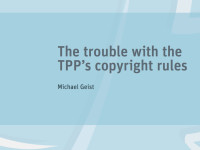Developing a national innovation strategy has been a top priority of Navdeep Bains, Canada’s Minister of Innovation, Science and Economic Development. Bains has created an expert panel, held meetings across the country, and launched a public consultation in the hope of identifying policies that might enhance Canada’s lacklustre innovation record.
While some have used the consultation to call for expanded intellectual property rules, the reality is that Canada already meets or exceeds international standards. The more pressing innovation issue is to address the abuse of intellectual property rights that may inhibit companies from innovating or discourage Canadians from taking advantage of the digital market.
My technology law column (Toronto Star version, homepage version) notes the benefits of an anti-IP abuse law could be used to touch on the three main branches on intellectual property: patents, trademarks, and copyright.











